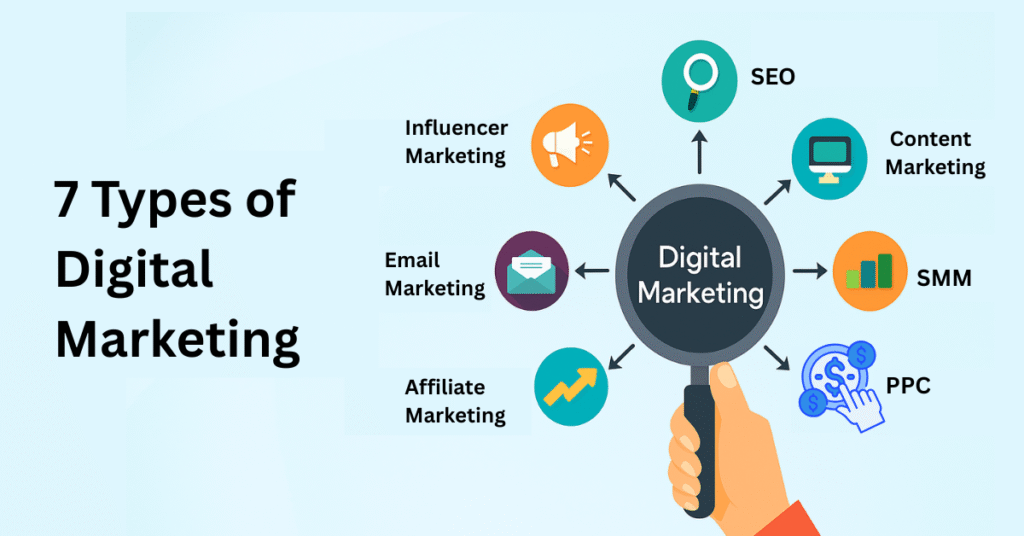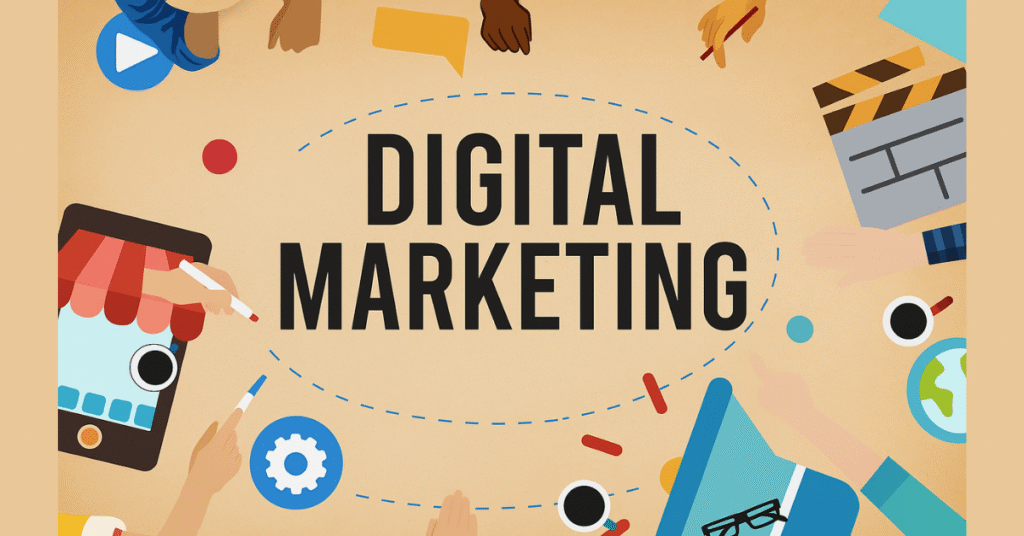In a tech-driven world, businesses can no longer rely solely on traditional marketing methods. Consumers are spending more time online than ever before, searching for information, shopping, engaging on social media, and connecting with brands. To thrive in this environment, brands must embrace digital marketing, a powerful approach that enables them to connect with their target audience, build stronger relationships, and achieve measurable results.
But with so many options available, where should a brand start? The good news is that certain strategies have consistently proven to deliver impact and value. In this blog, we will break down the top seven types of digital marketing every brand must use to stay relevant, grow visibility, and drive conversions.
What is Digital Marketing?
Digital marketing involves using internet-based platforms to advertise and connect with audiences about products, services, or brands. Unlike traditional methods such as print ads or billboards, digital marketing focuses on reaching customers where they spend most of their time: online.
From search engines to social platforms, from email inboxes to YouTube videos, digital marketing allows brands to engage audiences across multiple touchpoints. The biggest advantage is measurability; you can track clicks, leads, conversions, and even customer journeys in real-time.
Moreover, digital marketing is flexible and cost-effective. Whether you are a small business or a global brand, these strategies can be customized to suit your goals, audience, and budget.
7 Types of Digital Marketing Every Brand Must Use

1. Search Engine Optimization (SEO)
SEO is the backbone of digital marketing. It involves optimizing your website and content to rank higher on search engine results pages (SERPs). When potential customers search for keywords related to your products or services, your brand must appear at the top.
Why it matters:
- Increases organic traffic.
- Build credibility and trust with your audience.
- Delivers long-term results compared to paid ads.
By focusing on keyword research, high-quality content, link building, and technical site improvements, SEO ensures your business gets discovered by the right people at the right time.
2. Content Marketing
Content is king in the digital world. Content marketing is all about creating valuable, relevant, and engaging material that educates and attracts your target audience. This could be in the form of blogs, articles, videos, infographics, podcasts, or even interactive tools.
Why it matters:
- Positions your brand as an industry authority.
- Nurtures customer relationships.
- Drives traffic and boosts conversions.
Brands that consistently deliver helpful content often win the trust of their audience and enjoy better long-term loyalty.
3. Social Media Marketing (SMM)
Social media platforms such as Instagram, Facebook, LinkedIn, and TikTok are essential for modern marketing. Social media marketing involves creating and sharing engaging posts, stories, reels, and ads to reach your community.
Why it matters:
- Expands brand awareness to a global audience.
- Encourages two-way communication with customers.
- Provides insights through analytics and trends.
With billions of active users, social media is not just for visibility—it’s also a powerful tool for storytelling and humanizing your brand.
4. Pay-Per-Click Advertising (PPC)
PPC is a paid form of digital advertising where you only pay when someone clicks on your ad. Google Ads and social media platforms like Facebook and LinkedIn offer robust PPC options.
Why it matters:
- Delivers instant visibility on search engines and feeds.
- Allows precise targeting by demographics, interests, and location.
- Provides measurable ROI.
PPC is especially useful for new businesses or campaigns that need quick results while SEO and content marketing build momentum.
5. Email Marketing
Despite the rise of social media, email marketing remains one of the most effective digital channels. It involves sending personalized messages, newsletters, product updates, or offers directly to a customer’s inbox.
Why it matters:
- Builds long-term relationships with subscribers.
- Offers one of the highest returns on investment.
- Enables targeted and segmented campaigns.
Well-crafted emails nurture leads, encourage repeat purchases, and keep your brand top-of-mind.
6. Influencer Marketing
Influencer marketing leverages the credibility and audience of influencers—individuals who have built trust and authority in their niche. By collaborating with influencers, brands can tap into their loyal communities.
Why it matters:
- Creates authentic endorsements that resonate with audiences.
- Expands reach into specific niches.
- Builds trust faster than traditional advertising.
Whether through social media shoutouts, product reviews, or brand partnerships, influencer marketing can dramatically boost awareness and sales.
7. Affiliate Marketing
Affiliate marketing is a performance-based strategy where brands partner with affiliates who promote their products or services in exchange for a commission. Affiliates may use blogs, websites, or social media to generate sales.
Why it matters:
- Cost-effective, since payment is tied to performance.
- Expands reach without heavy upfront investment.
- Provides measurable results through tracking links and analytics.
This approach works well for e-commerce brands looking to scale sales quickly with minimal risk.
Conclusion
The world of digital marketing is vast, but these 7 types of digital marketing —SEO, content marketing, social media, PPC, email marketing, influencer marketing, and affiliate marketing—form the foundation of a strong online presence. Every brand, regardless of size or industry, can benefit from using a combination of these methods to maximize reach, build trust, and drive sustainable growth. If you are unsure where to begin, partnering with a professional digital marketing company can help you design and execute the right strategies for your brand. Seventh Foundation specializes in creating tailored digital marketing solutions that ensure your brand not only stands out but thrives in the competitive online space. Now is the time to embrace these digital marketing strategies and position your brand for long-term success.

Leave a Reply